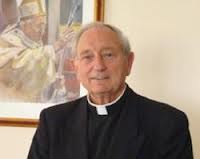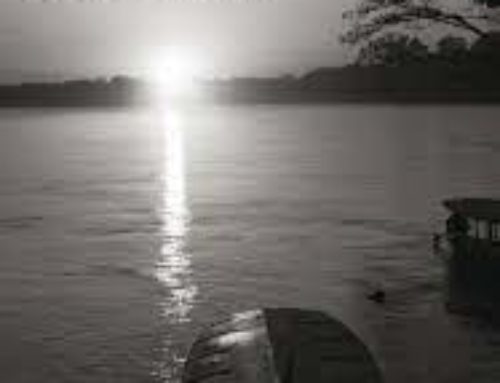The Twelfth Sunday of Ord Time B (2024) Boarbank Hall 22..06.2024
Introduction
The readings at today’s Mass mirror the lived experience of the apostles and St.Paul. In the case of the apostles they are in the boat with Jesus on the lake of Galilee when a fierce gale threatens their lives (Mk 4:35-41). These men in the boat were at home on the lake where they made their livelihood. It is 13 miles long and eight miles wide, one of the biggest inland lakes in the world. Squalls were and are usual on it. The apostles would have had experience of them before; after all fishing there was their business. But it was not the business of Jesus who worked either as a stone mason or a carpenter. He is asleep on a cushion in the boat. That kind of boat we now have detailed knowledge of since one such was retrieved from the lake dating from that time. It is in the museum of the Kibbutz Ginnosar. The details in Mark of the apostles’ boat correspond well with this archaeological find. The boat is 28 feet long and six feet wide. According to Mark Jesus was fast asleep, unaware of the danger and the apostles waken him to apprise him of it, but not asking him to do anything about it. What followed astonished them. The winds and the seas obey him. That is when in a very simple narrative their experience of salvation from drowning was a prelude for them to the extended meaning of eternal salvation through the death and resurrection of Jesus. He had dominated nature’s destructive hostility. What the wider implications of this were for the gospel was written in detail. It tells the whole story…from the beginning (Mk 1:1ff.)
St.Paul
Paul informed his converts that he was not an earthly companion of Jesus. But he was extraordinarily well versed in the Jewish background of Jesus. His revealed experience of the death and resurrection of Jesus focused his mind on how this background chimed with the Old Testament hopes which the life of Jesus later exemplified for the apostles. Jesus and his work of salvation he called a “new creation”. The Genesis account of the first creation describes it as good. Human beings were at home in that world dominating it until they disturbed its harmony. Then it became hostile. The first reading at today’s Mass from Job 3:1ff illustrated just how incomprehensible ordinary life was, with the innocent suffering inexplicably. The suffering and death of Jesus fitted into this picture for Paul. The resurrection was a new creation, death overcome, peace restored, God was in Christ reconciling the world to himself. This was historical and cosmological; it affected human beings profoundly and the universe they live in.
Life’s pilgrimage
In the Hebrew tradition, despite all the dreadful suffering endured across the centuries, prophetic voices kept on giving the people hope, accompanied by love and compassion. They developed a profound understanding of what humanity, made in the image and likeness of God, can hope for. The Ten Commandments were at the heart of it: how to relate with God and how to relate with others. The future depended on the realistic appropriation of the past. But a new creation does not imply that the old creation that God made good would simply disappear and from nothing would come something entirely new. The first creation was the world coming out of nothing (creatio ex nihilo). The new creation is the transformation of the person who believes in Christ and belongs to him (2 Cor 5:17). There was a tradition among the rabbis that any gentile who was circumsised and became a full Jew was ‘a new creation’. The thought is very similar to what we find in St. John: ”Truly, truly, I say to you unless one is born anew, he cannot see the kingdom of God”. Nicodemus objects and Jesus clarifies: “unless one is born of water and the Spirit, he cannot enter the kingdom of God” (Jn 3:5 ff.).
Faith in Christ results in a profound change in the believer’s stance towards life. That person will be enabled to relate positively with other human beings and thus all believing humanity will be influenced and enabled to live the way Jesus lived. ( St. Paul extends the thought to the cosmic scale in Romans 8:22, speaking of the hope for the transformation of the whole cosmos- in the future. Here one recalls Isaiah 65:17 and 66:22 where the prophet speaks of a new heaven and a new earth, and Is 43:18-19 has words very similar to Paul’s in today’s Corinthian text).
Conclusion
St. Paul developed the meaning of belief in the life, passion, death and resurrection of Jesus especially through practical experience. In 2 Corinthians he gives many examples of his own desperate situations, shipwrecked three times and spending a day and night drifting on the open sea. He was jailed and lashed, and deserted by friends and abandoned. He is talking about all this as belief in Christ that is a new creation. He would have known the dark night of despair threatening because of the mystery of innocent suffering, illustrated in the Job excerpt from today’s Mass (Job 3:1.8:-11). All the time he was sustained by the Jesus who had dominated the destructive waves and restored calm. This same Jesus had helped the sick and reconciled the alienated. He himself had been alienated and ultimately sentenced to a shocking death. Paul knew all this and was able to bear all his sufferings because of his faith in Christ’s suffering and resurrection as a new creation.
Such is life’s pilgrimage which we all have to make. A reconciled community helps us bear our burdens and the burdens of others. Mostly concealed in our own consciences we know what others go through. Most of the time we do not talk about it, but we know it so well: uncertainty, loss and loneliness. Christians will be assured by today’s Gospel that with Christ in their struggling boat they should never give in to despair. How people in the Ukraine, the Sudan, and in so many places need encouragement! All are our fellow human beings and many our fellow Christians. Amen.
Rev. Richard J.Taylor.
Mater Care International
Spiritual Advisor








